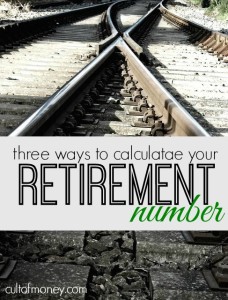 I was listening to one of my favorite podcasts over the weekend and heard some shocking numbers.
I was listening to one of my favorite podcasts over the weekend and heard some shocking numbers.
Did you know that 76% of Americans are living paycheck to paycheck? How about the fact that less than half of Americans have more than $25,000 in savings and investments? And only 1 in 10 Americans even know how much they’ll need for retirement!
Let’s not become a statistic. We’ll start with resolving the easiest of these three problems: calculating what you need for retirement.
Here are three ways to calculate your retirement number.
Multiply Your Final Salary By 12
This is by far the easiest way to calculate your retirement needs. Let’s say for instance you plan on earning $60,000 per year. You’d simply multiply 60,000 by 12 for a grand total of $720,000 in retirement savings.
This method assumes that you will receive social security and also used the 4% safe withdrawal rate.
Multiply Expected Expenses by 25
I personally like this rule a little better. It’s hard for me to determine what my final income will be and I also don’t know if that final income number will be close to what I actually need in retirement.
With the expense method I feel I have a little more control.
To make this work simply take your expected expenses and multiply by 25. Since you won’t be saving for retirement during retirement and you’ll likely be debt free your expenses will probably be lower than what they are now.
I like to think that I could more than comfortably live off $4,000 per month or $48,000 per year during retirement. If this holds true I’d need $1.2 million dollars to retire.
This method also assumes you’ll receive social security and uses the 4% safe withdrawal rate.
*Note that I didn’t subtract expected social security benefits from my savings because I’d rather be safe than sorry.
Use a Retirement Calculator
Because there is SO much that can go into calculating your retirement number using an actual retirement calculator might be the safest way to go.
With a retirement calculator you can enter your current savings, future savings, expected return on investment, and the age you want to retire. The calculator will tell you if your savings are likely to last that long. And if they aren’t you’ll know what to do instead.
Some good retirement calculators are:
It’s Better to Be Safe than Sorry
At the end of the day it’s going to be hard to estimate exactly what you need for retirement. That’s why it’s better to over-save than to under-save.
You don’t want to hit your golden years, run out of money, and then have to look to someone else to take care of you. (Or work at Wal-mart.) So figure out what you need but I’d encourage you to be conservative in doing so.

Alexa Mason is a freelance writer and wanna be internet entrepreneur. She is also a newly single mom to two beautiful little girls. She chronicles her journey as a single mom trying to make it big at www.singlemomsincome.com.
